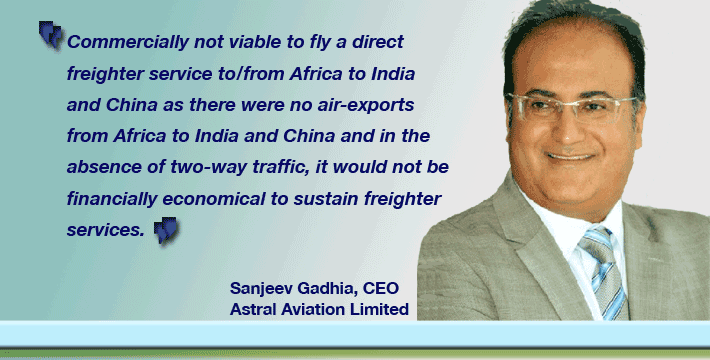| 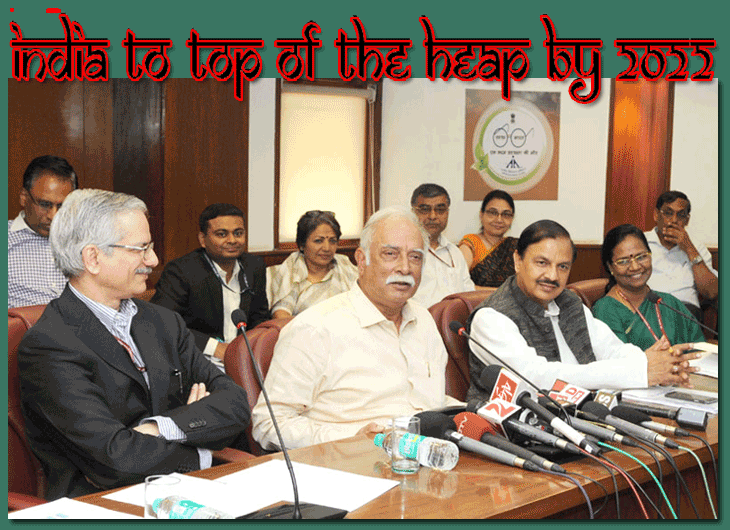
Minister for Civil Aviation Ashok
Gajapathi Raju at a press meet in New Delhi. The Minister
of State for Culture (Independent Charge), Tourism (Independent
Charge) and Civil Aviation, Dr. Mahesh Sharma (on Minister
Raju’s left); Secretary, Ministry of Civil Aviation,
R. N. Choubey (extreme left); and Director General of
Civil Aviation M. Sathiyavathy (extreme right) are also
in the picture.
India’s
much-awaited Civil Aviation Policy was recently approved
by the Cabinet and made public.
Announcing the policy,
which took almost two years to formulate, Civil Aviation
Minister Ashok Gajapathi Raju pointed out that India’s
aviation sector is poised to become the world’s
third largest by 2022.
The policy states that
providing safe, secure, affordable, and sustainable
air travel for passengers and air transportation of
cargo with access to various parts of India and the
world would be the government’s mission. Minister
Raju has often emphasized the importance of air cargo
and the aviation policy specifically looks at that.
First,
The Passengers
In an interview with
a business daily a few days before the release of the
policy, the minister pointed out that in India, aviation
was centered on passengers.
“For some odd reasons
in India, aircraft are passenger-centric, running like
a bus.
“But the largest
airline in the world is a cargo airline.
“Here, we only have
two cargo airlines.” India had a good domestic
cargo market, he said, “and with e-commerce volumes
going up, there was need for more dedicated cargo carriers.”
Hell
With Dwell
“Ultimately, transport
should not become a bottleneck for economic activity.
“This is what we
are trying to achieve,” he said.
“Cargo,” he
underlined, “has a tremendous potential.
“Right now, there
is very little cargo going in the belly of aircraft
and being exported out of the country.
“The problem is
that India’s dwell time is not very good.
“So, (our) strategy
is to bring down this dwell time.
“We have to work
together in the government and try to see that this
dwell time goes down,” the minister said.
Opening
Up The Skies
One of the major policy
decisions is whether to grant permission to domestic
carriers to fly abroad, doing away with the earlier
5/20 rule (carriers had to complete five years of flying
domestic routes and also have 20 aircraft in their fleet).
Now, Indian carriers can
fly abroad if they have 20 aircraft or 20 percent of
their capacity, whichever is higher.
 Another
decision that has been hailed by experts is one that
allows foreign airlines to join hands with overseas
investors to set up a fully foreign-owned airline. Another
decision that has been hailed by experts is one that
allows foreign airlines to join hands with overseas
investors to set up a fully foreign-owned airline.
A part of the liberalization
policy of the Narendra Modi-led government (in fact,
Modi had tweeted: “Gov’t radically
liberalizes FDI regime with the objective of providing
major impetus to employment & job creation”),
the move, according to KPMG’s Amber Dubey, will
have a salutary effect on Indian carriers since they
“can look for enhanced valuations in case they
wish to raise funds or go for partial or complete divestment.”
“We may see its
positive impact over the next six to 12 months.”
He also mentioned that
the government had plans to go for a massive improvement
in the country’s global and domestic connectivity,
affordability, and ease of doing business.
Express
Council Chimes In
For cargo stakeholders—especially
the express industry—the policy is a breath of
fresh air. Vijay Kumar, Chief Operating Officer, Express
Industry Council of India (EICI), went on record to
point out that the government’s moves to usher
in reforms for the Indian aviation industry was laudable.
“The policy takes
cognizance of the distinctiveness of the Express Delivery
Services and the potential it offers, also recognizing
Express Delivery Services (EDS) as a separate segment
within air cargo owing to its distinctive nature and
processes,” said Kumar, emphasizing that EICI
had been advocating such a demand on behalf of the express
industry.
The EICI COO also mentioned
that the “Express Industry is turning out to be
a pivotal segment for enhancing exports, especially
in the small-and medium-sized enterprises (SME) segment,
in view of expansion of e-commerce and other new age
industries.
Make In India & Air Cargo Promotion
With the emphasis of
the government on ‘Make In India’, ‘Ease
of doing business’ and enhancement of exports,
it is all the more important that EDS is recognized
and facilitated with adequate infrastructure at the
airports, with rational lease tenures and rentals to
provide efficient services in India.
Other than the express
business, the policy has provided a booster dose to
the air cargo sector.
To ensure the growth of
the sector, cargo facilities located at an airport will
be covered under the ‘Harmonized List of Infrastructure’
and will receive the benefits of the ‘infrastructure’
sector, enabling air cargo facilitators to avail flexible
structuring of long-term project loans, long-term funding
from infra- funds at lower interest rates, as well as
Income Tax benefits.
Air
Cargo Logistics Promotion Board
According to the policy, the Air Cargo Logistics Promotion
Board (ACLPB) will play a major role. The board will
promote growth by finding ways to reduce costs, improve
efficiency, and bring about better inter-ministerial
coordination.
Time
Tables
The board and the industry
have been tasked with submitting a detailed action plan
after consultation with stakeholders on how to reduce
dwell time of air cargo from ‘aircraft to truck’
to below 48 hours by December 31, 2016, and to 24 hours
by December 31, 2017.
For exports, the dwell
time will be reduced to 12 hours by December 31, 2016,
and eight hours by December 31, 2017.
In addition, the board
will develop non-legal and indicative Service Delivery
Modules after consultations with stakeholders for all
elements of the air cargo express cargo value chain
such as airlines, airports, terminal operators, Customs
House Agents (CHA), freight forwarders, and government
agencies like Customs, airport security, quarantine
officers, etc.
There is also provision
to set up an Air Cargo Community System that will avoid
delays.
It’s important to
note the policy has recognized the fact that the space
allocated for cargo was inadequate both on the air side
and city side at a majority of the country’s airports.
ACLPB
Hands On Ahead
The ACLPB will recommend
norms for space allocation for air cargo, including
express cargo for all Greenfield airports. Further,
an action plan will have to be worked out by the ACLPB
to boost space at existing airports on a “case
by case basis” in consultation with stakeholders.
Single
Window Access
To ease business processes,
the government, says the policy, will ensure that all
relevant central government authorities—Customs,
wildlife clearance, Drug Controller, Plant and Animal
Quarantine, Food Safety & Standards Authority of
India (FSSAI), Archaeological Survey of India, etc.—would
be available through a single window at cargo terminals,
where clearances would be provided promptly and online
after necessary checks.
Pointing to the implementation
of the 24x7 Customs operations at airports, the policy
mentioned it had not been utilized by the industry.
So, the ACLPB will consult
stakeholders and propose steps to ensure cargo handling
is done round the clock.
The suggestions and recommendations
of the ACLPB would be given top priority.
The board has also been
given the responsibility to promote Free Trade Warehousing
Zones (FTWZ), Air Freight Stations, bonded trucking,
and dedicated cargo airports.
Getting
Down On User Charges
One of the contentious
issues for air cargo stakeholders was the user charges
at airports. The ACLPB along with the Airports Economic
Regulatory Authority (AERA) and airport operators would
recommend competitive user charges. For the non-metro
airports handled by the government controlled Airports
Authority of India (AAI), the lease and other fixed
charges would be kept low to ensure they do not become
entry barriers.
The policy has to be implemented
to make it a success. Minister Raju felt it was time
to sensitize that the opportunity was available and
“we need to harness it.”
Tirthankar Ghosh
|













 Another
decision that has been hailed by experts is one that
allows foreign airlines to join hands with overseas
investors to set up a fully foreign-owned airline.
Another
decision that has been hailed by experts is one that
allows foreign airlines to join hands with overseas
investors to set up a fully foreign-owned airline. 
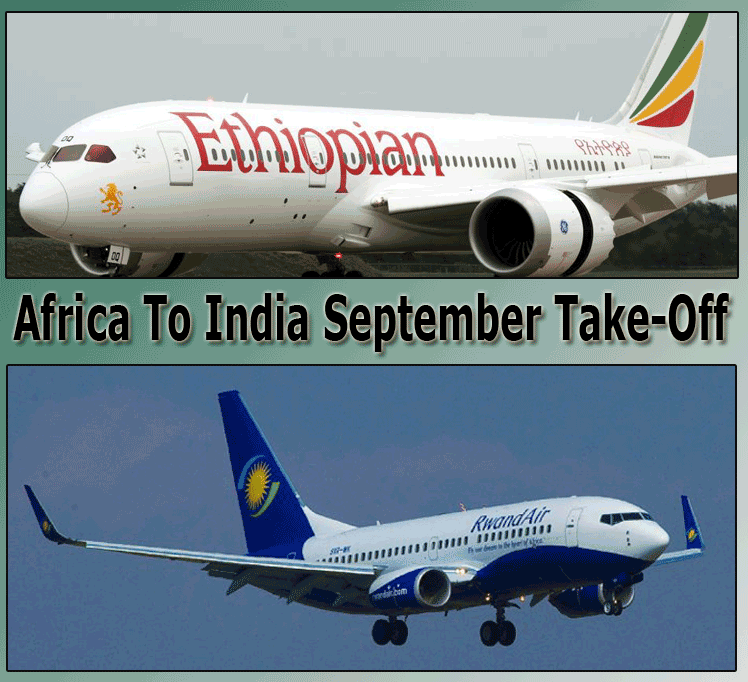
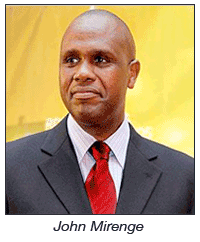 RwandAir
will begin flights to Mumbai in September of this year,
marking another milestone in India–Africa relations.
RwandAir
will begin flights to Mumbai in September of this year,
marking another milestone in India–Africa relations.
 With
an eye on India’s growing aviation market, Ethiopian
Airlines has chalked out plans to expand operations.
With
an eye on India’s growing aviation market, Ethiopian
Airlines has chalked out plans to expand operations.
 Air Djibouti, the national
airline of Djibouti, says it is seriously looking at
cargo services from India (Air Djibouti was relaunched
with management from the Wales-based Cardiff Aviation,
which was founded by English heavy metal band Iron Maiden’s
Bruce Dickinson). Senior Director of Strategic Planning
Dawit Michael Gebre-Ab notes that India’s trade
with Africa was still in its nascent stages and there
was room for growth.
Air Djibouti, the national
airline of Djibouti, says it is seriously looking at
cargo services from India (Air Djibouti was relaunched
with management from the Wales-based Cardiff Aviation,
which was founded by English heavy metal band Iron Maiden’s
Bruce Dickinson). Senior Director of Strategic Planning
Dawit Michael Gebre-Ab notes that India’s trade
with Africa was still in its nascent stages and there
was room for growth.  Air
Djibouti is banking on its infrastructure to provide
cargo: it will soon have the biggest free trade zone
in Africa.
Air
Djibouti is banking on its infrastructure to provide
cargo: it will soon have the biggest free trade zone
in Africa. 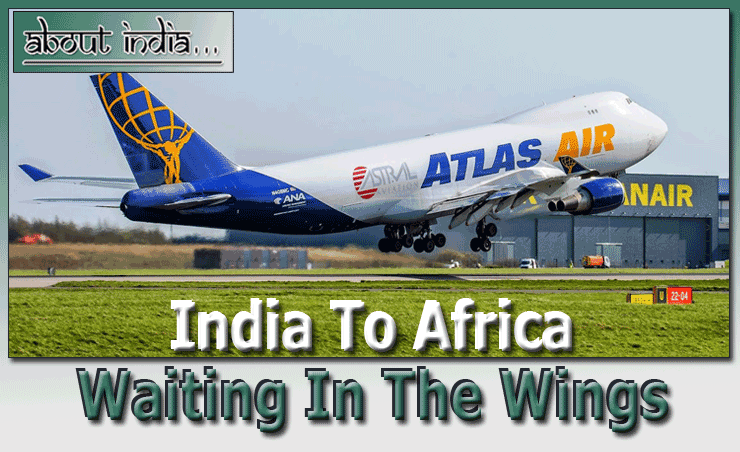
 The
overtures to boost trade made by Indian Prime Minister
Narendra Modi to 54 African leaders at last October’s
third India-Africa Forum Summit (IAFS) are yet to see
action on the ground.
The
overtures to boost trade made by Indian Prime Minister
Narendra Modi to 54 African leaders at last October’s
third India-Africa Forum Summit (IAFS) are yet to see
action on the ground. 